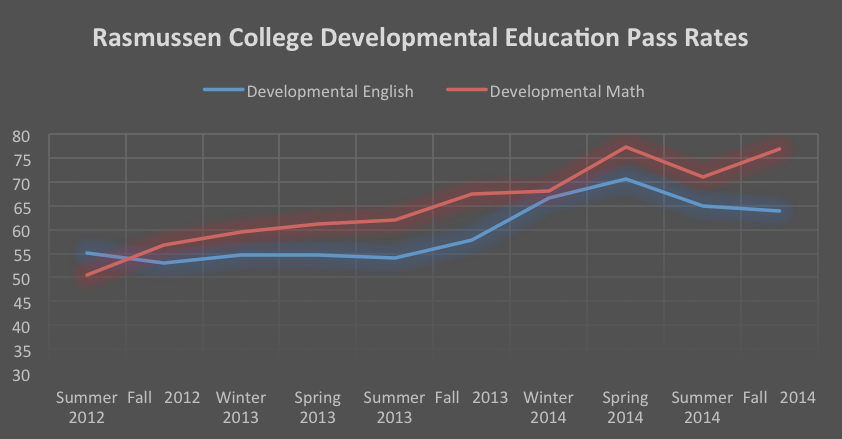
Here’s how Rasmussen College has increased its developmental education pass rates by double digits while decreasing the number and percentage of students who require remedial coursework.
FROM RASMUSSEN COLLEGE DEVELOPMENTAL EDUCATION STUDENTS:
“I am one who hated math because I couldn’t understand it. I came into this class with the attitude that I was going to fail and have to retake the class. I am so amazed that my average is in the 90s and I have even gotten a score of 100 on a test! I really amazed myself! Just take plenty of notes so that you can go back and look at examples and see how to do the problems.”
“The demonstrations really help. There is still a lot I don’t get, but with these videos I am beginning to understand.”
Driven by faculty-based action research, redesigned residential and online courses, and changes to placement testing, Rasmussen College has increased its developmental education pass rates by double digits while decreasing the number and percentage of students who require remedial coursework.
Like many institutions of higher education, Rasmussen College prioritizes developmental education given its impact on new-student experience, graduation, and overall institutional health. In 2012, the college committed to an overhaul of developmental education in an effort to improve outcomes. At the time, Rasmussen College’s developmental education experience included four courses into which students were placed through examination: 1) integrated reading and writing, 2) pre-algebra, 3) intermediate algebra, and 4) geometry.
Pass rates fluctuated by term, but often hovered around 50%, meaning the other half of the student population were either failing or withdrawing. This required reform.
Rasmussen College is a regionally-accredited college founded in 1900 near Saint Paul, Minnesota. A career-focused, baccalaureate institution, Rasmussen College offers online, on-ground, and blended courses, though most of its learning seats — including approximately 85% of those in developmental education coursework — are online.
Thus, our challenge was not only to improve the developmental education experience, but to do so in a largely online environment.
What We Did
Diversity of Entrance Placement Assessment
First, Rasmussen College improved how students were placed into developmental education.
In addition to its entrance placement assessment, which measured prospective students’ abilities in writing, reading, and mathematics, Rasmussen College implemented test waivers based on prior college success in math and English. Students earning C grades or higher in college-level math and/or English courses prior to enrolling at Rasmussen College are eligible to waive the corresponding portion of the assessment, thus eliminating the possibility of developmental education double jeopardy.
From 2012 to 2014, this new policy and other factors reduced the college’s remediation seat total by 13% while the persistence of new Rasmussen College students remained steady.
Faculty-Driven Action Research
Developmental Education faculty were, and remain, the cornerstone of our remediation successes. Beyond classroom delivery, faculty led the design of Rasmussen College’s remediation courses. Crucially, faculty also met weekly with the Dean of the School of General and Developmental Education to share positive and negative trends they were seeing in their classrooms. With the assistance of an instructional designer, the dean and faculty were able to make swift changes to the course designs in the vein of action research, which uses ongoing assessment and action to improve outcomes.
Acceleration
Since 2011, a growing body of literature has emerged from the Community College Research Center (CCRC) and other organizations that supports the effectiveness of accelerated developmental education. Given these data, and the support of faculty designing the courses, Rasmussen College chose to accelerate its new developmental education courses. Under this new structure, students complete their developmental education courses in roughly half the time needed to complete non-remedial courses. Despite this acceleration, the amount of contact hours, content, and assessment did not decrease.
Achieving this balance between acceleration and a positive, yet appropriately challenging, new student experience required a new model for accelerated course design. Rasmussen College’s model is a confluence of:
- Synchronous learning,
- Formative assessment
- Media-rich demonstrations
- Student voice
Synchronous Learning
Given the high percentage of students who complete their developmental learning online at Rasmussen College, the new course design placed significant weight on mandatory synchronous, collaborative learning. Students participate in live online sessions between one and three hours’ duration, during which faculty facilitate exploration of the week’s content. This provides a space in which online students can practice, make mistakes, receive encouragement, and collaborate with faculty and peers.
Students taking their developmental education courses in residential or blended settings rely on their in-person time for this collaboration.
Formative Assessment and Media
Additionally, students in the new developmental education courses are provided with asynchronous, faculty-built media.
Students in the developmental math courses participate in weekly discussion forums by first watching recordings of faculty working through problems on an online white board. Faculty sometimes solve the problem correctly and occasionally make “mistakes” which students are asked to consider. Students then reflect on the process and apply what they have learned.
In developmental English, students are provided a series of ungraded, media-rich, low-stakes formative assessments built by faculty, leading up to summative assessments.
Motivational Framework
Shortly after the new courses were launched, despite some increased success rates among engaged students, Rasmussen College faculty continued to see disengaged developmental education students failing and withdrawing.
This was deemed our Zero Trend, meaning that multiple zeroes in a student’s gradebook often trended toward the student’s failure.
In an attempt to increase engagement, all developmental courses were adjusted to highlight student inclusion. The literature that drove this effort was Diversity & Motivation: Culturally Responsive Teaching in College by Ginsburg and Wlodkowski (2009). In that book, the authors posit that when four key characteristics — inclusion, meaning, attitude, and competence — are present in the design and delivery of college courses, adult students are more motivated to learn and persist.
Examples of this motivational design include asking students to discuss their path to college in our synchronous online classrooms, addressing inclusion.
English students write about a person in their lives with whose decisions they disagree. Building attitude, they are asked to think critically about why they disagree and offer preferred outcomes.
In developmental math, our students build meaning and competence by solving math problems in backward fashion, then consider other problems in their lives or communities which could also be solved backward.
The Results
While, as you see below, pass rates have increased, the college is still gathering data on the Motivational Framework’s impact on our Zero Trend:

Moving Forward
Rasmussen College remains focused on continuous improvement of its developmental education experience, using student data and faculty feedback to improve student learning outcomes.
Despite the shift in 2012 to an accelerated, partially synchronous online learning experience, our student success has grown out of quality course design consistently vetted and improved by faculty engaged in action research. This model has not only benefitted our students and courses, but is also conducive to faculty acclimation to non-traditional course design and delivery.
References
Ginsberg, M. & Wlodkowski, R. (2009). Diversity & motivation: Culturally responsive teaching in college (2nd Ed.). San Francisco, CA; Jossey-Bass.

